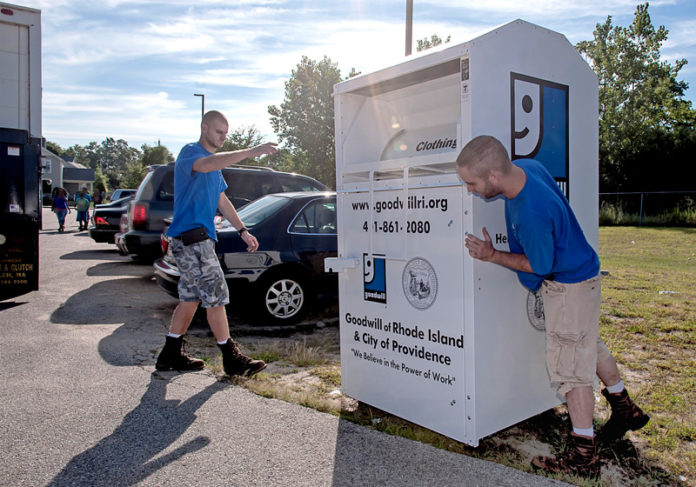
Rhode Island’s landfill has about 24 more years of life left in it, but a new push to recycle stained, worn and damaged clothes and other textiles may help stretch out that life a little longer.
That’s the message inherent in the R.I. Resource Recovery Corporation’s push to raise awareness and advocate for recycling everything from sweaters, blankets and stuffed toys, to backpacks, shoes, belts and Halloween costumes that may not be fit to wear. The state agency has gotten eight different collectors to agree to place stickers on nearly 900 bins around the state that are used for this purpose.
To promote the effort on Aug. 21 in a Warwick Mall parking lot, the collectors set up bins and asked for donations.
Krystal Noiseux, the state agency’s recycling program manager has led this campaign, following a presentation a year ago by a trade group known as SMART, or Secondary Materials and Recycled Textiles Association, whose past president made a pitch to educate consumers last spring.
“It was really news to us that textile recyclers – for-profit, nonprofit or hybrid – actually wanted clothing and other textiles that were torn, ripped or stained and that people would think weren’t suitable for recycling,” she said. “Once we realized the potential to reduce that amount of textiles from being buried in the landfill, we wanted to reach out to the public to make sure they knew what to do.”
As long as the textiles are dry, have no odor, and have not been exposed to hazardous waste, they are considered acceptable, Noiseux said.
Big Brothers Big Sisters of the Ocean State has always recycled gently used clothing and household items and has 125 bins in 50 locations around the state, said George Evans Marley, marketing and community-outreach specialist. The retail outlet Savers takes some of the nonprofit’s recycled clothing in exchange for money for the nonprofit’s mentoring program, he said.
“We are quite in favor of it,” he said of the state’s promotional efforts. “It allows us to open up what we collect and make it better known.”
Kevin Fisette, director of donated goods for Goodwill Industries of Rhode Island in Providence, one of the collectors whose bins carry a new sticker broadcasting the message, agrees. “It’s just getting the public to relearn what they should be donating in the bin. Most people think it has to be clothing that’s in good shape but if it’s stained or ripped it can be repurposed.”
Of the 800,000 tons of waste dumped into the landfill every year, about 5 percent, or 40,000 tons, are textiles. Of that, some unknown portion is likely to be comprised of damaged textiles that the public thinks cannot be reused and throws away, she said. Recycling these items will save space in the landfill for what really has to go there, Noiseux added.
With the recession, the influx of waste into the landfill actually slowed, Noiseux said, but in spite of that, a sixth and final expansion from 250 to 350 acres is planned.
Larry Groipen, a SMART past president, made the presentation to Noiseux in the spring of 2013. Groipen is president of ERC Wiping Products Inc. of Lynn, Mass., which recycles textiles for use as wiping rags. The industry for this waste stream exists, but people aren’t aware of it, he told Providence Business News.
“People are misinformed about what can be donated and recycled,” he said. “It’s a huge problem for the industry nationwide. Your grandmother and relatives say you can’t give those clothes away because they’re stained, or give those shoes away because the heel is broken: It was this idea that it was going to go to the little kid down the street, but what this really is about is recycling.”
The Resource Recovery Corp. tried to promote the concept last summer but found while leadership at the collection agencies quickly embraced the idea, execution was initially not as easy to implement, Noiseux said.
Planet Aid’s southern New England office supports 249 sites and 300 bins in Rhode Island, Connecticut and Massachusetts. Between Jan. 1 and Aug. 8 the agency retrieved 951,147 pounds of clothing and shoes from a total collection of more than 1 million pounds of trash, said Currin. •












